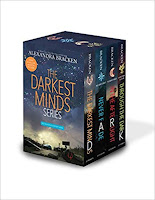I recently read these two series back to back. The first is Darkest Minds by Alexandra Bracken.
In Darkest Minds, the US government inserted a chemical into the water system which gave children different powers as they approached adolescence, if they survived at all. Their solution was to put them in camps to "heal them." Parents were told it was a viral outbreak and, fearing their children would die, had to turn them over to be cured. Of course, the government had other plans. Each child developed a different power and was assigned a color at the prison camps: Greens were ultra smart. Blues were telekinetic. Reds were fire throwers. Yellows could emit electrical charges and affect electrical systems. Oranges could control minds.
Ruby (one of the few Oranges left alive) and her allies Chubs, Liam, and Zu attempt to avoid recapture to free the kids still being held in camps. They encounter various antagonists along the way with the overall goal of overthrowing the main antagonist, the corrupt president who weaponizes them instead of "curing" them.
Bracken's effective descriptions of kids forced into camps resonates with our daily news. It is a chilling reminder that once we accept any justification for imprisoning people, it can lead to further justifications for doing so.
She deftly captures teenagers forced to grow up before they should have to in a world where adults can't be trusted.
The second series, Insignia by S J Kincaid, dispenses with illusions of government and openly places the power where it really resides: with corporations who own the most resources and have the most money. Multinational corporations control the solar system and use taxpayer funded militaries to fight a proxy World War III in space.
Tom Raines is a scrawny fourteen-year-old outlier with high level virtual reality gaming skills. He is drawn into a government program where teenagers are implanted with neural enhancements that give them superior strength and senses and neural ports that allow them direct access to computers.
His contempt for authority and rules gives him an edge when fighting. But it also makes him the perfect weapon against the multinationals.
Kincaid does an excellent job of crafting realistic teenage interactions between Tom and his friends Wyatt, Vikram, and the opposition's best, code name "Medusa." They may be thrust into an adult situation, but they still read like teens. I think she did an excellent job of presenting a young man's point of view and voice.
With anxiety-provoking daily headlines, one might ask, "Why read dystopian fiction. Isn't it depressing?"
My answer is this: they give me hope that heroes will emerge and send the message that we can save ourselves if we have the will. I need to see the good guys win.
When I started my young adult series Mythikas Island back in 2008, I had the same message in mind: that the children are our future and they have the power to change it, no matter how badly the adults have corrupted it.
We need to invest in our young people instead of dismissing them. They are far stronger, more creative, and more impassioned than they get credit for. They can make a difference. It encourages me to see so many young activists, inventors, and business entrepreneurs making waves in our world today. I salute and stand with them.




No comments:
Post a Comment